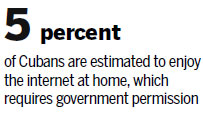Residents surf web at home in Havana pilot project
Downtown Havana resident Margarita Marquez said she received a special Christmas gift this year: web access at home, a rarity in a country with one of the lowest internet penetration rates in the world.
Marquez, a 67-year-old retired university professor, was among those selected by the government two weeks ago to participate in a pilot project bringing the web into the homes of 2,000 inhabitants of the historic center of the island's capital.
Most of Cuba's 11.2 million inhabitants only have access to internet at Wi-Fi hotspots, and only then if they can afford the $1.50 hourly tariff that represents around 5 percent of the average monthly state salary.
Only 5 percent of Cubans are estimated to enjoy internet at home, which requires government permission. This is usually granted mainly to academics, doctors and intellectuals.
"It's like a dream come true," said Marquez, who lives with her sister in a second-story flat in a colonial-era building. "To be in touch with the outside world is important."

Her 80-year-old sister, Leonor Franco, said the news they had been selected came as a surprise and she was excited to be surfing the web for the first time.
"I had never had any experience of internet," she said, seated in front of a laptop she has owned for two years without web access, searching for videos of her favorite singers on YouTube.
She said she wanted to learn how to surf the web properly so she could make the most of the experiment, and for as long as the government provided free internet access.
"From March we will have to start paying and we don't know if we will be able to continue. So at least we are going to enjoy January and February," she said.
























